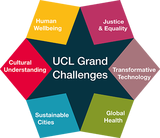Funding opportunities related to UCL 2034 for UCL staff.
Global Engagement Funds

UCL 2034 Principal Theme 6: Delivering global impact through a network of innovative international activities, collaborations and partnerships
About the Global Engagement Office
UCL’s Global Engagement Strategy is based on a commitment to international partnerships and the belief that bringing together different perspectives and diverse experience accelerates the process of discovery and global impact. To help deliver this strategy, the Global Engagement Office (GEO) supports UCL academics to collaborate with others who share their dedication to excellence and passion for knowledge, irrespective of where they are in the world.
Funding
GEO funding calls run on an annual basis, and application windows usually open between March and April for projects taking place in the next academic year. Some funding calls will also run in the Autumn term, so please check the GEO funding website for the latest updates: www.ucl.ac.uk/global/funding
Global Engagement Funds
Global Engagement Funds support academics in their collaboration with colleagues based at overseas institutions. Up to £2,000 is available for academics to stimulate, facilitate and accelerate activity with global partners. Applications to the Global Engagement Funds are open to all UCL academic staff from early-career researchers to senior professors.
Cities partnerships programme
The Cities Partnerships Programme is a new initiative which supports, funds and promotes academic collaborations in research and teaching with partners in major cities across the world. Proposals are invited for annual funding of up to £5,000 per project for academic activity involving one or more UCL individuals and partners based in selected cities – please see the GEO funding website for details.
Strategic Partner Funds
Larger grants of up to £10,000 are available annually to support academics collaborating with colleagues based at specific partner institutions. These funding calls are usually match funded by the partner institution, meaning more collaborations can be funded. For a list of strategic partner funds available please visit the GEO website.
Contact
Translational Research Office
About the Translational Research Office
The Translational Research Office aims to provide direct support and sign-posting to ensure the accelerated translation of UCL's biomedical science research to the clinic.
The TRO encompasses three groups:
• The Translational Research Group, which comprises eight research managers who work with investigators to develop translational research strategies, internal and external networking, attract funding, and manage projects to facilitate timely stage-gate progression;
• The Business & Innovation Group, which provides strategic support to Faculties across UCL through collaboration with industry stakeholders in the Healthcare sector and internally via the Therapeutic Innovation Networks; and
• The Drug Discovery group, which provides access to vast experience of pharma, biotech and academic drug discovery. The group undertakes and advises on all aspects of small molecule programmes from compound synthesis and enzyme- & cell-based screening.
All three groups align closely with key business partners to ensure the best support for academics and their translational projects. This includes a broad portfolio across all therapeutic modalities.
Funding
Therapeutic Acceleration Scheme (TAS)
TAS is an internal scheme that provides seed funding for early stage translational projects. With two calls every year (March and September), TAS aims to accelerate the transition from discovery science to the early stages of therapeutic development by providing responsive and flexible funding to support preliminary translational work.
A total fund of around £1.1m in funding is available for approximately 20 projects of up to £75,000 each. The scheme is open to early career researchers, as well as established academic staff at UCL and its associated hospital partners.
Working with the Research Coordination Office, the TRO also facilitates access to other internal funding including the Wellcome Institutional Strategic Support Fund awards for translational research and career development awards.
Contact
simon.eaglestone@ucl.ac.uk
@UCLTRO
www.ucl.ac.uk/translational-research
Grand Challenges

UCL 2034 Principal Theme 3: Addressing global challenges through our disciplinary excellence and distinctive cross-disciplinary approach.
About UCL Grand Challenges
The UCL Grand Challenges cover six broad areas of pressing societal concern: Global Health, Sustainable Cities, Cultural Understanding, Human Wellbeing, Justice & Equality and Transformative Technology. The six UCL Grand Challenges bring together researchers from across a wide range of disciplines at UCL to connect and collaborate, enabling cross-disciplinary responses to complex global challenges.
Funding
UCL Grand Challenges funds and supports new cross-disciplinary collaborations that address societal problems across its six major themes.
Small Grants
The Small Grants scheme encourages and supports cross-disciplinary activity based on scholarly excellence in different fields with the aim of producing novel insights and impacts both within our university, and beyond it in wider society. £7,500 is available for all UCL Staff. Applications for grants are available in term three, with funding awarded at the start of the UCL financial year (August/September).
Special Initiative Funding
Special initiative calls aim to promote activity in specific areas across the six Grand Challenges. £10,000 is available per theme for UCL Staff, with applications usually opening in term one.
Contact
grand-challenges@ucl.ac.uk
@UCL_GC
www.ucl.ac.uk/grand-challenges/funding-ucl-researchers
www.blogs.ucl.ac.uk/grand-challenges
Innovation & Enterprise

About UCL Innovation & Enterprise
UCL Innovation & Enterprise (I&E) works with UCL staff, students, alumni and external organisations to turn knowledge and ideas into practical applications that have the potential to benefit us all. A team of specialists with both academic and industry backgrounds, UCL I&E works with you to develop your ideas and skills.
Funding
Knowledge Exchange and Impact Acceleration Funding
UCL I&E manages two main sources of Knowledge Exchange (KE) and Impact funding:
- Research England’s Higher Education Innovation Fund (HEIF)
- UKRI Impact Acceleration Accounts (IAAs) from the Engineering and Physical Sciences Research Council (EPSRC) and the Science and Technology Facilities Council (STFC).
UCL staff, including professional services, are eligible to apply for HEIF funding to carry out KE and commercialisation projects.
All UKRI schemes are open to staff whose research has been funded by the relevant research council (either EPSRC or STFC). A maximum of £100k is available for projects applying UKRI-funded research into industry, or £30,000 for KE projects. STFC-funded researchers could apply for up to £20,000 aimed at maximising the impact of their funded research.
UCL I&E runs regular calls for proposals during the year. Their web pages are constantly updated with information on the calls and funding available, and prospective applicants are encouraged to check their website www.ucl.ac.uk/enterprise/funding for further details.
Apollo Therapeutics Fund
Apollo Therapeutics is a unique collaboration between three global pharmaceutical companies and the technology transfer offices responsible for commercialising the research from Imperial College London, UCL and the University of Cambridge. The £40m fund will provide translational research funding for early-stage therapeutics projects arising from the three universities. Find out more at www.apollotherapeutics.com
UCL Technology Fund
Jointly managed by UCL Business (UCLB), the commercialisation arm of UCL I&E, this £53m fund invests in intellectual property commercialisation opportunities arising from UCL’s world-class research base, with a focus on the physical and life sciences. The fund will support academics throughout UCL in achieving the full potential of innovations that have prospects for outstanding societal and market impact, right through the development journey from initial proof of concept to practical application. For more information, please visit www.ucltf.co.uk
UCL Social Ventures Fund
Managed by UCLB, this fund supports the development and growth of emerging social ventures arising from UCL research. UCL academics can benefit from up to £20,000 in funding, together with access to business planning support, and intellectual property (IP) advice. Please visit www.uclb.com/for-researchers/social-ventures for more information.
Contact
Public Engagement
About UCL Public Engagement
The Engagement team enables UCL and external communities to work together and bring about meaningful change and mutual benefit. Situated within UCL Culture, the team exists to champion UCL’s founding vision to open education and knowledge to the world.
Funding
Beacon Bursary
UCL Beacon Bursaries have funded outstanding engagement projects and project teams since 2009. Up to £2,000 is available per project for staff and postgraduate research students who want to connect their research and teaching with people outside UCL. The next round of funding will open in April 2020, with deadline early June 2020 to spend during the 2020/21 academic year.
Train & Engage
£1,000 is available for post-graduate students who have attended Train & Engage Training to run public engagement projects. The next round will open in June 2020, with a deadline in mid-July 2020 to spend during the 2020/21 academic year.
Contact
publicengagement@ucl.ac.uk
@UCLEngage
www.ucl.ac.uk/culture/public-engagement
www.blogs.ucl.ac.uk/public-engagement
UCL Public Policy funding schemes
About UCL Public Policy
UCL Public Policy is UCL’s institutional initiative to support academic policy engagement. Its main aims are to enable UCL researchers to develop a better understanding of how to engage with public policy and facilitate a greater awareness amongst policy professionals of UCL’s research capability.
Funding
Expert Engagement Small Grants
UCL Public Policy runs a small grants scheme, made available in June/July, to support work by the UCL community to enhance policy engagement and impact. UCL research staff, students and academics can apply for a grant of up to £4,000.
The Rapid Response Policy Advisory Scheme
This fund awards expert engagement grants to enable the development and delivery of urgent short-term policy work in response to policy demand. Up to £5,000 is available throughout the year to UCL academics from all subject disciplines with a clear and urgent policy demand that requires a rapid response.
Policy Fellowships
UCL Public Policy brokers funding for Policy Fellowships to support researchers to spend time with policy-focused organisations. This could involve working in government departments, Parliament or the third-sector for up to six months. UCL researchers from PhDs to Professors can apply for funding of up to £30,000.
Contact
public-policy@ucl.ac.uk
@UCLPublicPolicy
www.ucl.ac.uk/public-policy www.medium.com/policy-postings
UCL Research Facilitation and Coordination Offices
About the Research Facilitation and Coordination Offices
The Research Facilitation and Coordination Offices at UCL support and advise researchers on identifying, applying for and securing external funding, and assist in the development of strong research proposals. The Research Facilitation and Coordination Teams also help coordinate complex, large-scale strategic bids, and support and promote cross-disciplinary research communities and collaborations through the UCL Research Domains and other activities.
The teams also coordinate internal processes for selecting the best candidates to schemes which require demand management, provide training for potential applicants and arrange or participate in mock interviews for those invited by external funders. In addition, they highlight funding opportunities and manage strategic partnerships with major funders.
Advice, Support and Funding
Every academic or research unit within UCL’s eleven faculties is supported by one of the three Research Coordination Offices:
- SLMS: The Faculties of Brain Sciences, Life Sciences, Medical Sciences and Population Health Sciences
- BEAMS: The Faculties of The Bartlett, Engineering Sciences and Mathematical & Physical Sciences
- SLASH/IOE: The Faculties of Arts & Humanities, Laws, Social & Historical Sciences, the School of Slavonic and East European Studies (SSEES), and the IOE, UCL's Faculty of Education and Society
To find out more about available funding, support and advice, please contact the Research Coordination Office relevant to your School, or visit their website to find out more.
Contact
SLMS
slms.facilitators@ucl.ac.uk
@rco_slms_ucl
www.ucl.ac.uk/slms/ovph/rco
BEAMS
ovpr.beams@ucl.ac.uk
@UCL_BEAMS_SRF
www.ucl.ac.uk/research/support-staff/beams-research-coordination-office
SLASH/IOE
@UCL_SLASHIOE_RF
www.ucl.ac.uk/research/support-staff/slash-and-ioe-research-facilitation-and-coordination-team
 Close
Close

